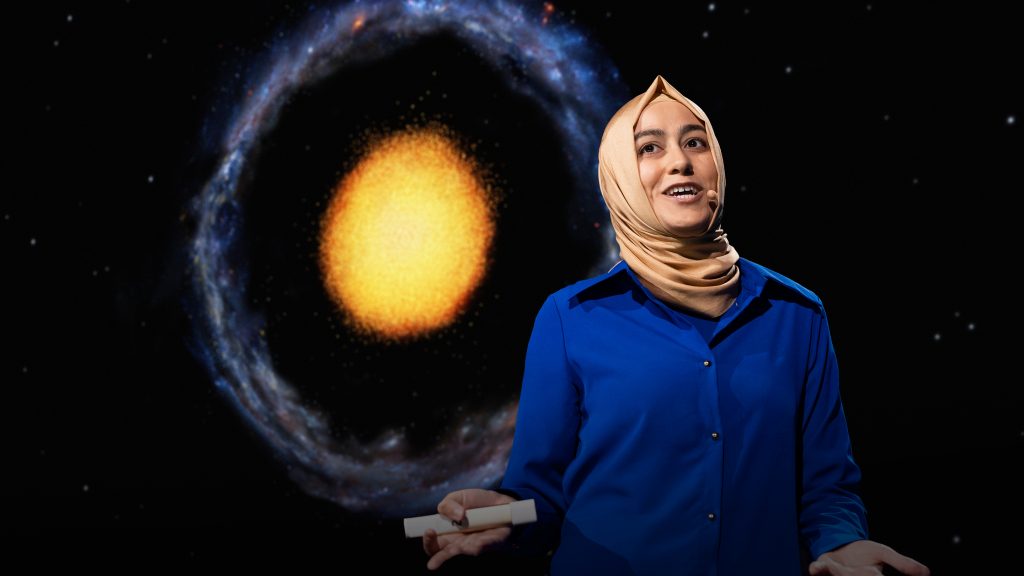There are trillions of galaxies in the universe, coming in all different shapes and sizes. The classic galaxy we think of is a spiral galaxy, with blue arms shaped like a whirlpool. The most common type of galaxy is an elliptical galaxy, with a reddish color and a ball-like shape. But Dr. Burçin Mutlu-Pakdil discovered a new type of galaxy in our universe: a double-ringed elliptical galaxy.
Mutlu-Pakdil grew up in Turkey, in a small town where few people had an education beyond elementary school. From a young age, she was interested in the night sky. In high school, she tested into the prestigious Beşiktaş Atatürk Anatolian high school where she studied the physical sciences. She started her collegiate journey at Bilkent University—one of the best universities in the world—in Ankara, Turkey. Despite her already impressive accomplishments, she still faced adversity due to her gender. On her first day, a male professor asked her, “Are you crazy? You are a woman, and you left your hometown to study physics?” Nevertheless, she completed her bachelor’s in physics in 2009.
After completing her undergraduate degree, Mutlu-Pakdil faced the next big hurdle: immigrating to the United States to pursue graduate education. This monumental feat was all but unheard of in her small hometown, but she took the leap and started her master’s program at Texas Tech University, completing her degree in 2012. She completed her Ph.D. in astrophysics from the University of Minnesota – Twin Cities in 2017.
During her Ph.D. program, Mutlu-Pakdil made her incredible discovery. Galaxy PGC100714 is a peculiar galaxy, approximately 359 million light-years from Earth. Originally, her team thought it was a Hoag’s Object: a known but extremely rare type of galaxy consisting of an elliptical galaxy surrounded by a blue ring of stars. But infrared imaging revealed a second, completely separate ring of stars. There is currently no known way in nature to make a double-ring elliptical. Today, Mutlu-Pakdil continues to study PGC100714 at the University of Arizona’s Steward Observatory, where she serves as a postdoctoral fellow.
Despite being in the early stages of her career, Mutlu-Pakdil has received several awards and honors for her work in astrophysics. In 2017, she won the Linda Larson Student Woman of the Year Award and was named one of Ten Outstanding Young Persons of Turkey. She was also the American Physical Society’s Woman Physicist of the Month in July 2017. In 2018, Mutlu-Pakdil was awarded a TED Fellowship and was one of the Junior Chamber International Ten Outstanding Young Persons of the World.
In addition to her incredible work in astrophysics, Mutlu-Pakdil also finds time to be an active member of the science community and an advocate for diversity and inclusion. She’s a member of the American Astronomical Society, the American Physical Society and the Association for Women in Science. During her graduate work, she organized cultural events and volunteered to judge children’s science fairs. Last year, she participated in the Rising Stars in Physics Workshop—an MIT program to bring women into physics and promote diversity in the field. In March of this year, she even gave a talk at the San Diego Comic Fest. She currently serves as co-chair of the Tucson Women in Astronomy group and as an astronomy ambassador for the American Astronomical Society.
Are you interested in empowering women in the STEM fields? The Women in Science (Wi-Sci) group wants you! Email President Emily Larner (emily.larner@mail.umkc.edu) for more information.








